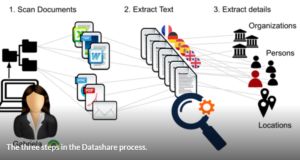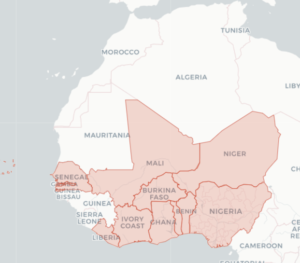
Analytics Power Discoveries in ICIJ’s West Africa Leaks

Graph analytic technologies and techniques played a major role in West Africa Leaks, the latest International Consortium of Investigative Journalists (ICIJ) project to unearth illegal or unethical activities or investments that powerful individuals have hidden using offshore law firms and tax havens.
A group of ICIJ member journalists released their first batch of West Africa Leaks stories yesterday in a bid to shine a light on abuses of trust and ethics by business and political leaders in 15 countries occupying the west coast of the impoverished continent of 367 million people.
The ICIJ used the same set of tools to analyze the Appleby data as it used to dig into the Mossaack Fonseca data, including the Elasticsearch search engine, the Neo4j graph database, and graph analysis tools from Linkurious to highlight connections. ICIJ also built its own open-source tool called Extract for obtaining meta-data and entities from the documents.
These types of tools are often used by large banks that are trying to spot fraudulent activity or big retailers that want to find similarities in buying patterns. According to William Lyon, a developer relations engineer at Neo4j, they’re also useful for tracing through the complex transactions that powerful individuals sometimes use to cover up their tracks.

ICIJ’s new Datashare platform is designed to promote wider data mining of leaked data among remote groups of journalists
“A graph database is necessary to show the nested layers of ownership that can be concealed in complex webs of offshore legal entities,” Lyons tells Datanami via email. “Tracing these kinds of connections without a graph database, across hundreds of thousands of documents, is very difficult.”
Another technological element at play here is ICIJ’s new Datashare technology, which the group discussed last week. The Datashare program builds on the group’s Extract technology — which uses Apache Tika to create machine-readable text from files, Tesseract OCR to apply optical character recognition to images, and Elasticsearch — to present a shareable knowledge graph to journalists. When one journalist identifies a link in the data — perhaps connecting two individuals or entities — they can share that with others.
As in in previous ICIJ projects – including the Panama Papers project in 2016 that led to resignation of Iceland’s prime minister – the West Africa Leaks project is based on a large amount of leaked data.
The West Africa Leaks data actually came from multiple sources. Some of the data originated from Appleby, a law firm based on the island nation of Mauritius east of Madagascar, which led to the ICIJ’s Paradise Papers project in late 2017. And some of the data came from Mossack Fonseca, the Panamanian law firm at the center of the Panama Papers leak in 2016.
All told, the West Africa Leaks involved 27.5 million files, representing multiple terabytes worth of data. With its collection of data tools running in the cloud accessed by data analysts and investigative journalists, ICIJ was able to parse through the data and tease out the connections that some sought to hide. No powerful politicians or diplomats have resigned yet as a result of the data journalism project. But the West Africa Leaks is succeeding in making some of them uncomfortable.
One of the individuals identified in the data operation was Dr. Kwame Bawuah-Edusei, who was previously Ghana’s ambassador to the United States, Switzerland, and Austria, and who is currently Ghana’s permanent representative to the United Nations.
While the physician freely acknowledges his interest in oil exploration ventures on his personal webpage, Dr. Bawuah-Edusei apparently did not disclose that he maintained an interest in a Cayman Islands-based company that sold its share of an offshore oil field for $305 million while he served as a diplomat. That constituted an ethical violation, according to an ICIJ member’s expose yesterday in the publication Cenzo. “Vienna Convention…prohibits diplomats from actively engaging in business outside their home countries,” the story reads.
More questions were raised from ICIJ’s data-driven exploration into the inner workings of a complex international deal involving a sale of Chevron assets in the oil-rich West Africa region.
According to the Cenzo story, Chevron Africa Holding Limited sought to sell five Chevron oil subsidiaries and one Texaco subsidiary in Nigeria, Benin, Cote D’ivoire, Congo, Cameroon, and Togo to MRS holdings Ltd, oil marketing company owned by the Nigerian billionaire Sayyu Dantata. However, instead of doing a straight-up sale for the assets, which were estimated to be collectively worth $1 billion, the deal was run through a Panamanian firm called Corlay Global SA, which ICIJ says enabled the participants to shield the transactions from the local taxation authorities.
“The end result of the transaction was a Nigerian entity acquiring another Nigerian company via two shell companies in-between,” writes Bassim Al-Hussaini in the Cenzo story.
According to Will Fitzbiggon, ICIJ’s Africa partnership coordinator, a pattern of exploitation that has worked its way across Africa for years should be brought to light. “Today’s stories reveal financial secrets about some of West Africa’s most powerful politicians and business leaders,” he writes in a blog yesterday. “It’s the first time these people have come under this kind of scrutiny.”
Related Items:
Big Data Analytics Flashes a ‘Red Alert’ on Human Trafficking in India
Inside the Panama Papers: How Cloud Analytics Made It All Possible
Predictive Analytics, Visualization Enlisted in Crime Fight




























